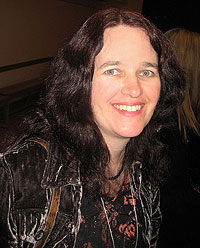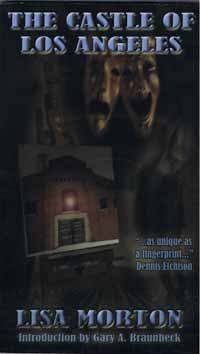Stoker Spotlight: Thirteen Questions with Lisa Morton, author of The Castle of Los Angeles
 Lisa Morton won the 2010 Bram Stoker Award for Superior Achievement in First Novel for The Castle of Los Angeles, published by Gray Friar Press. In addition to nearly 50 short fiction appearances in books and magazines, Lisa is the author of two acclaimed novellas, The Lucid Dreaming (which won the 2009 Bram Stoker Award for Superior Achievement in Long Fiction) and The Samhanach. She is also one of the world’s foremost authorities on Halloween and has been seen on The History Channel and the Blu-Ray edition of Trick ‘R Treat talking about her favorite holiday. Her first fiction collection, Monsters of L.A., will be out later this year from Bad Moon Books.
Lisa Morton won the 2010 Bram Stoker Award for Superior Achievement in First Novel for The Castle of Los Angeles, published by Gray Friar Press. In addition to nearly 50 short fiction appearances in books and magazines, Lisa is the author of two acclaimed novellas, The Lucid Dreaming (which won the 2009 Bram Stoker Award for Superior Achievement in Long Fiction) and The Samhanach. She is also one of the world’s foremost authorities on Halloween and has been seen on The History Channel and the Blu-Ray edition of Trick ‘R Treat talking about her favorite holiday. Her first fiction collection, Monsters of L.A., will be out later this year from Bad Moon Books.
How would you describe The Castle of Los Angeles?
It’s a contemporary urban Gothic novel set in the world of small theater. With ghosts.
Tell us about what inspired you to write The Castle of Los Angeles?
Two things: 1) I love the traditional Gothic novel (I’m talking things like the works of Ann Radcliffe and the book I stole my title from, The Castle of Otranto), and I thought it would be interesting to apply all of the tropes of the true Gothic—like, for example, the heroine must be an orphan—to a contemporary story; and 2) I had friends who had been running a small theater out of a place in downtown L.A. called the Brewery, which is a huge collection of artists’ lofts, and every time I went there the building (it had once been an honest-to-goodness brewery) seemed ripe for a good haunting.
What was your writing process like for the book? Do you have a regular writing routine or schedule?
I have a strange process: I work a story over and over in my head until I think it’s ready, then I type it out. With a novel, that means I’m outlining and making notes for a while so I don’t forget things as I work through them.
 What most attracts you to writing horror?
What most attracts you to writing horror?
All of the emotions are amplified, and notions of good and evil become very basic. If I wasn’t writing horror I’d be writing humor, because it’s another way to reach people at a very basic emotional level.
What are some of the themes you explore in your writing? Are there any topics you consider “out of bounds” even for horror fiction?
One of the themes that appears in CASTLE as well as some of my short stories is the responsibility of the artist. Does a writer have a responsibility? Does it go beyond merely entertaining? Because I believe it does, I would never write something that implied approval of a reprehensible act, nor would I write anything that could conceivably a “how-to manual” with detailed instructions on committing a criminal or violent act. I know other writers, especially crime fiction writers, will do these things, and I’m truthfully not sure how I feel about it.
What are you writing now?
Two non-fiction books: a Halloween history for Reaktion Books, and a graphic novel (with Rocky Wood and artist Greg Chapman) about the history of the witch persecutions for McFarland. And yes, I’m dying to get back to fiction!
What do you see as horror literature’s role in contemporary culture?
I’m not sure horror should serve a different purpose than any other form of literature, unless it would be to point out new things that make us afraid!
Tell us about an experience or experiences with the HWA that influenced your writing or helped you as a writer.
Wow, there’ve been so many…I’ll just mention for me the highlight at this point, which was co-chairing (with John Little) the 2009 Bram Stoker Awards weekend. It was a tremendous amount of work, but everyone was so willing to help that I really felt like I was part of a true community of writers, and that was a fantastic feeling. I think I gained a whole new confidence level from that.
What advice would you share with new horror writers? What do you think are the biggest challenges most writers face?
I just finished guest-editing for an excellent fiction website, and as a result of that I’m going to say this to new writers: Follow guidelines! Especially if the project you’re submitting to has a
particular theme. Don’t assume your story is so brilliant that it won’t matter if it has nothing to do with the stated theme or is written in 14-point Arial font with single-spaced lines. It WILL matter, and editors don’t appreciate having their time wasted!
The biggest challenges most writers face? Getting sales, of course! Remember, you are competing against dozens or (likelier) hundreds of other writers for those few coveted slots, so you need to do everything you can to make your submission SHINE, which includes proper formatting, staying on topic, and good grammar and punctuation. It’s frankly amazing to me that writers have to be reminded of these things, but…they do.
What are three of your favorite horror stories?
Hmmmm…immediately off the top of my head I’ll go with: “The Black Cat” by Poe, “The Outsider” by Lovecraft, and “The Dog Park” by Dennis Etchison.
What’s your favorite Halloween memory or tradition?
Dressing up for a school pageant when I was in first grade. I wanted to be a cavewoman, and I dressed in an actual deer hide that was leftover from one of my dad’s hunting trips. I was a big believer in authenticity!
Given a choice, trick? Or treat?
Treat. And chocolate, please.
Do you feel like someone’s watching you?
Someone IS watching me. She sits above me on the back of the couch and watches everything I type. I dread those hypercritical meows.



